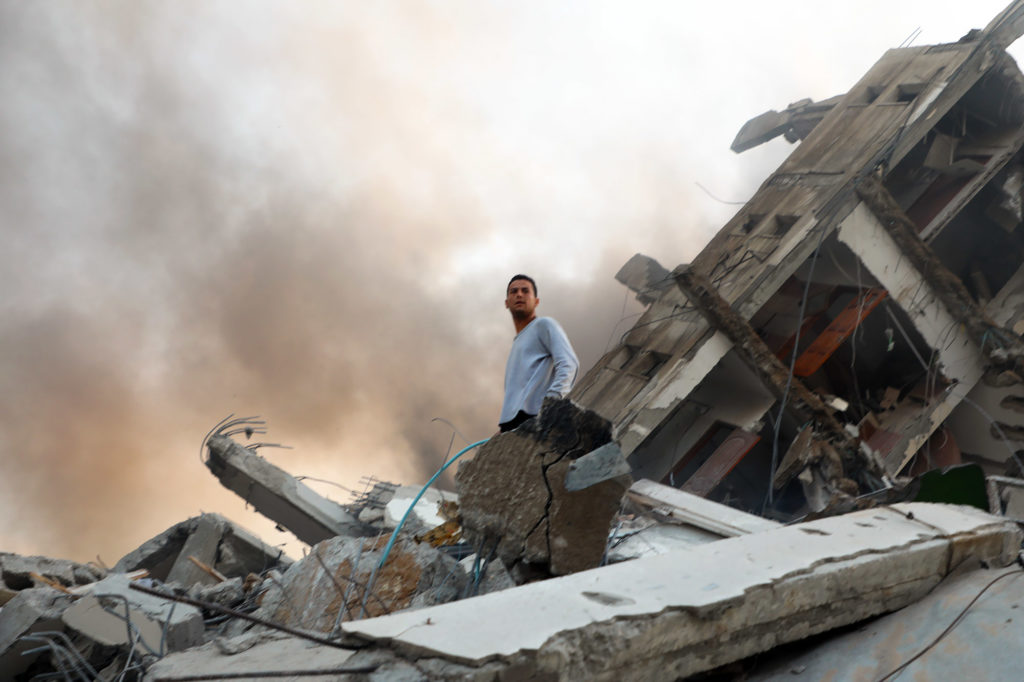Something Needs to Change
Posted in: Society & culture
I have worked in Anera’s communications department for 14 years, based in Washington, DC. I’m very proud of the organization’s history and many wonderful achievements. We have so much that we can point to that we have built over the years, and communities we’ve made stronger. Well, really it’s our staff in Lebanon, Palestine and Jordan who are making real change on the ground.
Our Middle East colleagues have often said to me, as a myriad of tragedies and crises have hit their countries, that they are so glad to be working for an organization where they can actually do something to improve things. It gives them hope, purpose and belief in better things in the future. And, it does that for us in Washington, DC, and for the whole Anera community of supporters around the world.
Anera was founded as an organization responding to the humanitarian needs of Palestinian refugees after the 1967 war. Right away we started delivering medicines and relief supplies and granting money to small nonprofits that help people in their local communities, from providing healthcare to educating children and youth.
Over the past 50+ years, Anera has evolved into being as much, if not more, of a development agency as a humanitarian relief organization. Our staff builds vital infrastructure in Palestinian communities and trains young people in skills that will get them jobs. They galvanize volunteers and help farming families grow plentiful crops. They come from the communities they serve, and they know what the problems are. And I know it means so much to them to see that the work they do really does make things better.
Palestinians in Gaza are rebuilding once again


All this brings me to the latest catastrophe that has befallen Gaza. I have worked at Anera for most of the period of the blockade, which started in 2007 after Hamas came into office. And I have been at the organization through all of the major bombing campaigns — 2008-2009, 2012, 2014, and now 2021. Of course, I have personally not experienced the horror of thinking that my family and I might die any minute, for days and weeks on end, every few years. But I often visit Gaza and have stayed in touch with my colleagues there and done my best to make sure their voices are heard.
After each bombing campaign, they would always express again their gratitude at being able to do something tangible and meaningful to help their communities. They have delivered many many millions of dollars worth of food, water, and medicines. You name it. They got out to work right away — and the meaning behind what they were doing and the hope that they were bringing to the communities around them is the fuel they used to keep going. They were fueled also by their belief in Gaza and the promise it holds.
Here we are now after the fourth bombardment. I’ve heard from many of our staff in Gaza that this was the worst in terms of the ferocity and frequency of the airstrikes. The strikes penetrated deep into the ground and made buildings shake. Many buildings in downtown Gaza City have been destroyed.
I spoke with one of my colleagues the other day who said that she and her family basically lived near the front door (the safest place — as if!) of their apartment the entire 11 days. They spent a lot of time crying together, and she thought to herself, ‘any second now a missile could take us all out and we would just be another statistic of the dead from Gaza. Just another number.’ She wondered if it was fair of her to bring her two wonderful daughters into that life and to keep them there, where they could die in an airstrike, rather than grow up to be an artist or a doctor or a teacher.
As in the aftermath of the other bombardments, our staff wasted no time at all and got to work within two days of the ceasefire. They’re already out there coordinating the making of hot meals for displaced families. They’re preparing water deliveries for people who have lost access. They’re working on plans for rebuilding destroyed and damaged water and sewage networks. They’re coordinating the delivery and purchase of vital medicines for hospitals and clinics. The needs are enormous!
But I can’t help but think about what it must feel like to leave your house for the first time in 11 days and see so much around you that’s destroyed. You come out and you see that once again — once again! — you have to rebuild Gaza. Not just rebuild infrastructure. And not just pick up the pieces around you, but rebuild some kind of sense of hope and belief in the future for yourself and your children. How do you go from being in a state of mortal terror to being in a state of hyper professionalism, making things happen quickly and seamlessly on the ground, on a ground that has been torn apart one more time?
Jack Byrne, Anera’s country director, said to me today: “This time it will take longer for people to recover than in previous bombardments, because with each new pounding Gaza takes, the harder it is for Gazans to just roll up their sleeves and get back to trying to build their lives again. But, in fact, that’s just what they’re doing.”
Anera is not an advocacy organization. But, come on, something needs to change! We can’t keep on going through this. I call on people reading this to keep tuned into the situation and to help other people understand what’s happening, from a Palestinian perspective. The news cycle in the West is already moving on from Gaza, leaving the people who live there to attempt to rebuild yet again. But we cannot move on with the news. Now is the time when people all over the world must come together to support Palestinian communities. International solidarity must be part of our daily lives.
People in Gaza are not just numbers. They are individuals who have real dreams that should be normal dreams, and the same innate potential for doing good things in this world and living full lives as anyone else. Don’t they deserve it, just like anyone else?
*Normally a post like this would come from one of our Gaza staff. For the reasons indicated above, that this is not feasible right now — they are still recovering from the ongoing traumatic experiences they live through. We hope to share some of their reflections in the weeks and months to come.
OUR BLOG
Related
In this log, Anera provides updates on unfolding war in Palestine and our response. In some cases, additional activities may be added retroactively to the daily entries as we receive additional program reporting. Questions? See our FAQ page July 10,…

